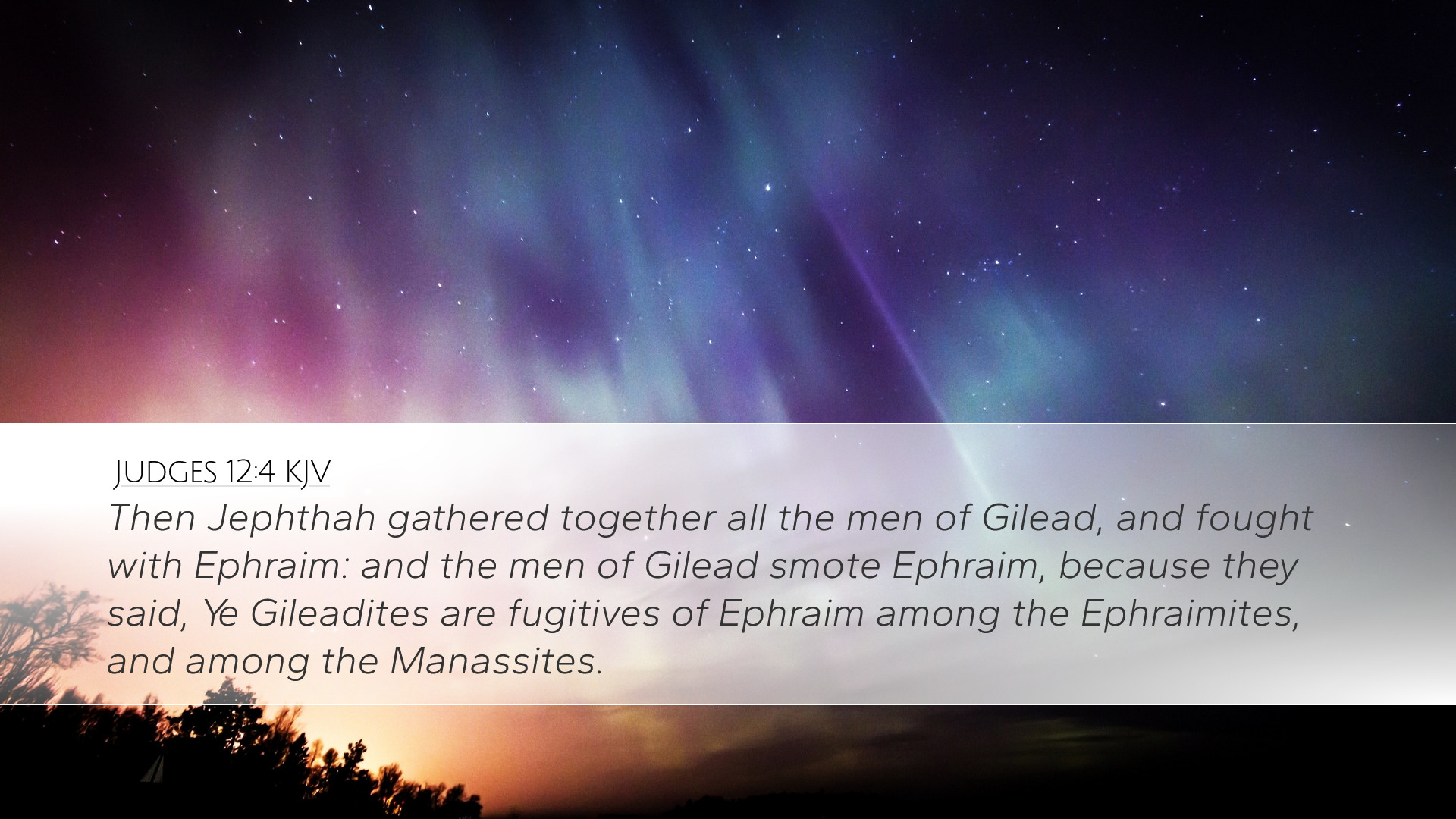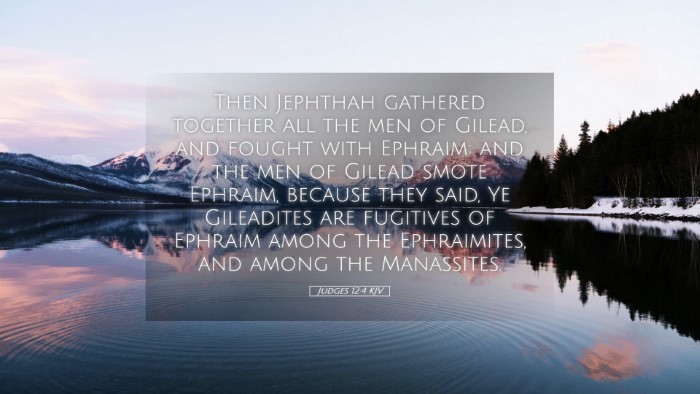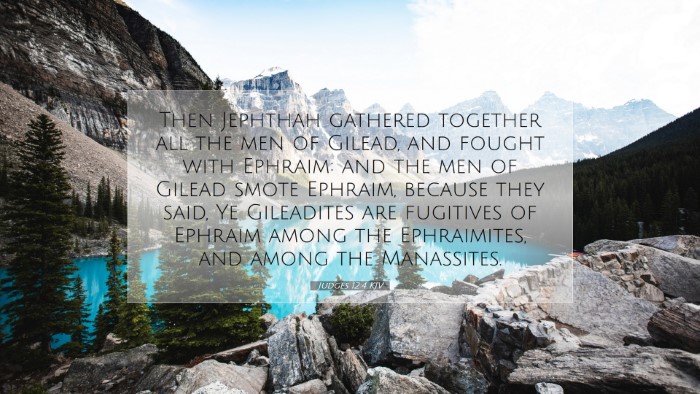Old Testament
Genesis Exodus Leviticus Numbers Deuteronomy Joshua Judges Ruth 1 Samuel 2 Samuel 1 Kings 2 Kings 1 Chronicles 2 Chronicles Ezra Nehemiah Esther Job Psalms Proverbs Ecclesiastes Song of Solomon Isaiah Jeremiah Lamentations Ezekiel Daniel Hosea Joel Amos Obadiah Jonah Micah Nahum Habakkuk Zephaniah Haggai Zechariah MalachiJudges 12:4
Judges 12:4 KJV
Then Jephthah gathered together all the men of Gilead, and fought with Ephraim: and the men of Gilead smote Ephraim, because they said, Ye Gileadites are fugitives of Ephraim among the Ephraimites, and among the Manassites.
Judges 12:4 Bible Commentary
Commentary on Judges 12:4
Text of the Verse: "Then Jephthah gathered together all the men of Gilead, and fought with Ephraim: and the men of Gilead smote Ephraim, because they said, Ye Gileadites are fugitives of Ephraim among the Ephraimites and among the Manassites."
Introduction
This passage occurs in a context of conflict and tension between different tribes of Israel, particularly between the Gileadites and the Ephraimites. Jephthah, a leader of Gilead, engages in battle due to provocations and slurs from Ephraim, revealing not only political discord but also deeper tribal rivalries and identity issues within Israel. This commentary will delve into the implications of the verse, drawing insights from multiple public domain commentators.
Overview of the Conflict
The background leading into Judges 12:4 is critical in understanding the dynamics at play. The tribal confederation of Israel was fraught with internal strife, heightened by regional pride and a history of grievances. Jephthah, having recently led Gilead in a successful campaign against the Ammonites, finds himself challenged by Ephraim, which accuses Gilead of acting independently and without their support.
Tribal Identity and Rivalry
According to Matthew Henry, this episode illuminates the fragile unity among the tribes. He emphasizes that the Ephraimites accused the Gileadites of being 'fugitives,' unless they held firmly to their tribal identity. This term reflects Ephraim's perception that Gilead, positioned on the fringes, was less legitimate in their governance of Israel.
Jephthah’s Leadership and Response
Albert Barnes reflects on Jephthah’s role, noting that his swift action in gathering the Gileadites signifies his capability as a leader. He effectively mobilizes his people to assert their standing against Ephraim’s challenge. The phrase 'gathered together' indicates a consolidation of forces behind a unified cause, showcasing the importance of leadership in moments of conflict.
The Nature of the Conflict
As analyzed by Adam Clarke, the conflict appears to be less about external enemies and more about internal tribal disputes. The Gileadites’ response to the Ephraimites indicates a readiness to defend their honor and autonomy. Clarke comments that this demonstrates the dangerous mixture of pride and territoriality within Israel, leading to needless bloodshed among brethren.
Theological Implications
This confrontation carries significant theological weight, revealing the complex relationship between tribal loyalty and divine purpose. The Gileadites, while defending their territory, also reflect the broader struggle of Israel to remain unified as a covenant community under God. The internal strife can be viewed as a manifestation of the people’s departure from the intentions of the covenant God.
Divine Sovereignty and Human Responsibility
Henry and others argue that while human rivalry leads to conflict, God remains sovereign over the outcome. Jephthah’s rise to leadership can be seen as part of God’s providential plan despite the turmoil. Leaders are called to navigate these tumultuous waters with wisdom and discernment, prioritizing the collective spirit God desires for His people.
The Consequences of Division
This incident exemplifies how division within the body of Israel can lead to devastating consequences. Clarke points out that internal conflicts serve to weaken the community when they should be united against common threats. The ensuing battle illustrates the danger of tribalism, which distracts from the larger spiritual calling toward unity and cooperation as God’s chosen people.
Lessons for Contemporary Believers
The lessons from Judges 12:4 resonate strongly with modern congregations and leaders. Here are several key takeaways:
- Valuing Unity: The fragmentation within the body of Christ cautions against any form of tribalism or factionalism. Believers must champion unity, identifying themselves primarily as followers of Christ rather than adherents to strict denominational lines.
- Conflict Resolution: Jephthah’s immediate gathering of men to address the conflict serves as a model for addressing disputes promptly and decisively in a way that seeks resolution rather than escalating animosity.
- Leadership in Crisis: Leaders today should be inspired by Jephthah’s readiness to act. In times of crisis, effective and righteous leadership can guide individuals through tumult and into restoration.
- The Role of Accountability: Ephraim’s accusations highlight the importance of mutual accountability and shared purpose among believers. We are called to support one another rather than undermine through competition.
Conclusion
Judges 12:4 and its surrounding context offer profound insights into the nature of leadership, tribal identity, and the collective responsibility of God's people. By examining the actions and motivations of those involved, we glean timeless principles for contemporary faith communities. Drawing from the wisdom of commentators like Henry, Barnes, and Clarke, modern readers are reminded of the call to unity, the need for discernment, and the sovereign hand of God directing His people in all circumstances.


